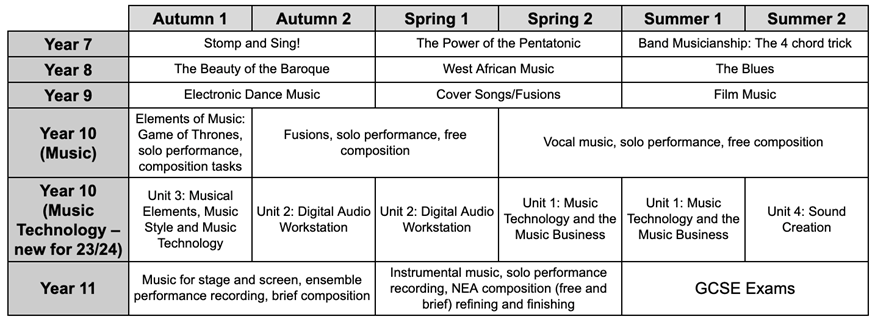MUSIC
Curriculum Purpose
We are all musicians
We will equip our students with the knowledge (Tacit, Procedural, Declarative) to have lifelong confidence and ability to critically engage with music, whether that be performing, composing or listening.
The needs of our community
We will expose pupils to music and musical opportunities beyond their community, building their cultural capital, at the same time as equipping them with the tools to understand music more deeply within their community.
Preparing for academic success
We will provide pupils with a solid academic foundation to pursue the study of music to GCSE, A level, and careers beyond, should they wish to do so. This includes building a solid foundation in singing through KS3.
Teaching music for its intrinsic value
Music is an amazing subject to study, encompassing the buzz of performing, creative satisfaction of composing and the complex cognitive work in analysing. Our curriculum celebrates all of these elements, and provides our students with a platform to showcase their creativity, increase their self confidence and collaborate with others.
Curriculum Rationale
What do we teach and why do we teach it?
In line with the national curriculum for music, students learn to perform, compose, listen and analyse music of increasing complexity over their time at Trinity. They also gain a secure understanding of the elements of music through performing and composing music in a variety of genres and styles. When choosing what music to focus on, we have a number of considerations at play. We choose genres that give our students the best opportunity to practise and experience a particular concept (for example, 4 chord pop songs are a good way introduce triads and harmony), but also we have a duty to introduce our students to music beyond their normal experience (Baroque Music in Year 8, Fusions and Electronic Dance Music in Year 9). This balance is constantly reviewed and refined, as we also want to encourage students to listen critically, play, and respond to music that is around them.
In terms of performance, we focus primarily on singing and keyboard in Year 7 and 8, because we think these are the best instruments through which students can explore music and express themselves successfully, however we explore instruments such as the djembe and the ukulele in some units. We also encourage students to use their knowledge and skills from peripatetic instrumental lessons and to use their own instruments in the music classroom.
In terms of composition, we begin without instruments – using body percussion to compose. During Years 9 and 10, students use the keyboard to generate their ideas, and from Year 9, we introduce Music Technology as a means to organise and create a larger number of musical ideas. During the GCSE course, students are then encouraged to compose on the medium that suits them, whether that be technology, their instrument or voice.
Why do we teach it in that order?
The focus of Year 7 and 8 is to build a secure foundation in the understanding of music. This is done through a spiral curriculum, where we learn about the elements of music (ie. rhythm) both theoretically and practically, and these elements are revisited with increasing complexity and challenge. By the end of Year 7, students will have a secure understanding of how the musical elements work in isolation: how to play and construct rhythms, melodies and chords (harmony), and also a basic understanding of how to play the keyboard. This understanding is built on in Year 8, where musical elements are explored in conjunction with one another: students explore the interaction between melody and harmony and Baroque music, as well as rhythm and texture in West African Music. Generally speaking, throughout all phases, students explore music first through listening and performing it, and then deepen their understanding of it through creating music in that style.
From Year 9, students are able to compose more complete pieces of music with greater complexity and creativity. They move from group and paired composition tasks to individual composition tasks, and in years 10 and 11 they are encouraged to use their knowledge and skills more creatively, in having more freedom over what music they compose and how they do it. In terms of performance, students focus on accuracy and fluency as well as basic technique and later learn how to play and sing with increasing expression, and how they can make their own mark on the interpretation of a piece of music.
Curriculum Overview

